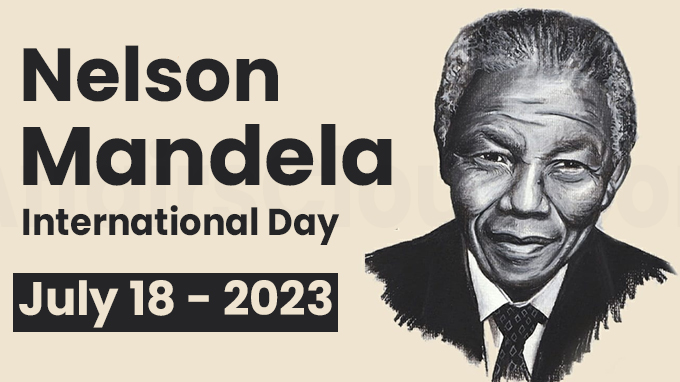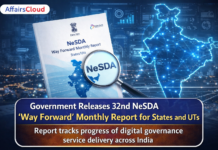
The United Nations (UN)’s Nelson Mandela International Day is annually celebrated across the world on 18th July to recognise Nelson Mandela’s values, including his commitment towards social justice, peace, reconciliation, and promotion and protection of human rights.
- This day also marks the birth anniversary (July 18, 1918) of Nelson Rolihlahla Mandela, who played an eminent role in creating non-racial constitution, non-sexist and democratic of South Africa.
- The day is also called as Mandela Day.
- The 2023 Mandela Day marks the 105th birth anniversary of Nelson Mandela.
The 2023 theme for Nelson Mandela International Day is “Climate, Food & Solidarity”.
Background:
i. On November 2009, the United Nations General Assembly (UNGA) passed a resolution A/RES/64/13 and declared 18th July of every year (his birthday) as “Nelson Mandela International Day“.
ii. The resolution acknowledges Nelson Mandela’s contribution to the struggle for democracy internationally and the promotion of a culture of peace throughout the world.
iii. The first UN’s Nelson Mandela International Day was observed on 18th July 2010.
Nelson Mandela Prize:
i. On 6th June 2014, the UNGA adopted the resolution A/RES/68/275 and established UN’s Nelson Rolihlahla Mandela Prize (Nelson Mandela Prize), an honorary award.
ii. The Prize will be presented as a tribute, to recognize the achievements of those who dedicated their lives to the service of humanity as guided by the purposes and principles of the UN.
iii. The prize was awarded for the first time in 2015 and in 2020 for the second time.
Nelson Mandela Rules:
i. The UNGA’s resolution A/RES/70/175 adopted the revised UN’s Standard Minimum Rules for the Treatment of Prisoners.
ii. It also approved that these rules should be known as the “Nelson Mandela Rules” in honour of the legacy of Nelson Mandela.
iii. The goal is also to promote humane conditions of imprisonment; to raise awareness about prisoners being a continuous part of society; to value the work of prison staff as a social service of particular importance.
Nelson Mandela Decade of Peace (2019 – 2028):
On 24th September 2018, UNGA adopted the resolution (A/RES/73/1) at UN’s Headquarters in New York, the United States of America (USA) for the Nelson Mandela Peace Summit and recognised the period from 2019 to 2028 as the Nelson Mandela Decade of Peace.
About Nelson Mandela:
i. Nelson Rolihlahla Mandela was born in Mvezo, South Africa on July 18, 1918 was a prominent anti-apartheid activist.
ii. He served as South Africa’s first black president from 1994 to 1999.
iii. He was inaugurated as South Africa’s first democratically elected President on May 1994 and passed away on December 5, 2013.
Awards:
i. On December 1993, he jointly received the Nobel Peace Prize with Frederik Willem de Klerk for their significant contribution to peaceful elimination of apartheid in South Africa.
ii. In 1990, Government of India awarded Nelson Mandela its highest civilian award, the Bharat Ratna in his honour and to recognize his contribution towards eliminating racial discrimination worldwide.
- Over the last 40 years Nelson Mandela has received more than 250 awards.
Books:
Long Walk To Freedom, the Autobiography of Nelson Mandela; The Prison Letters of Nelson Mandela; No Easy Walk to Freedom.
Events of 2023:
i. On the occasion of Nelson Mandel International Day, a virtual public service activity was organised by the UN to limit global warming and take care of our planet on 18th July 2023.
- It was a campaign activity based on the Nelson Mandela’s quote “We must never forget that it is our duty to protect this environment”, initiated via the UN campaign app ‘ACTNOW’ for Living Sustainably in the Modern World.
ii. The UNGA has organised an informal plenary meeting to mark Nelson Mandela International Day on 20th July 2023, in New York, the USA, and the meeting will be addressed by CsabaKőrösi, President of the UNGA; AntónioGuterres, UN Secretary-General; Andrew Young, Politician, activist, and Former Permanent Representative of the USA to the UN.




